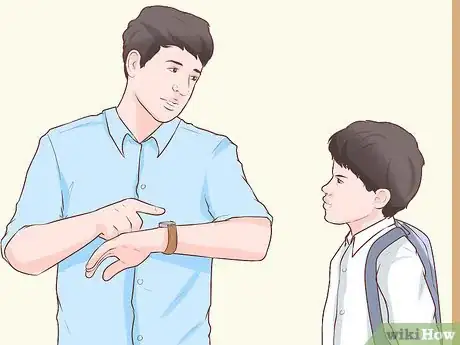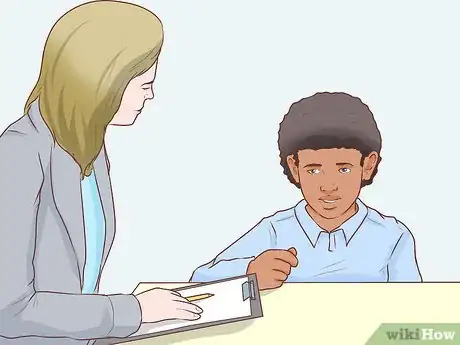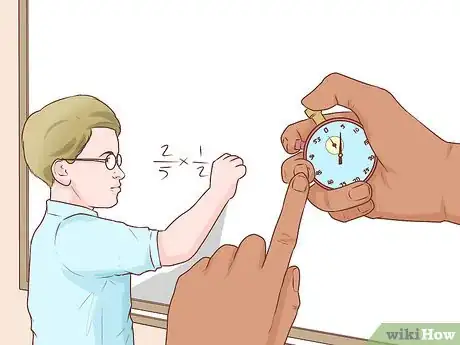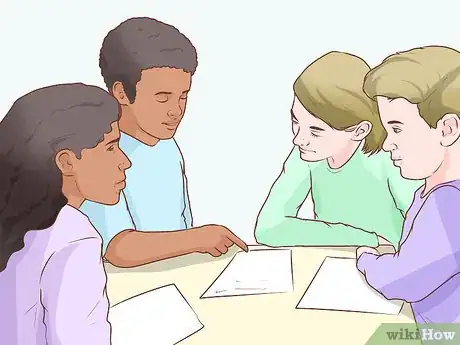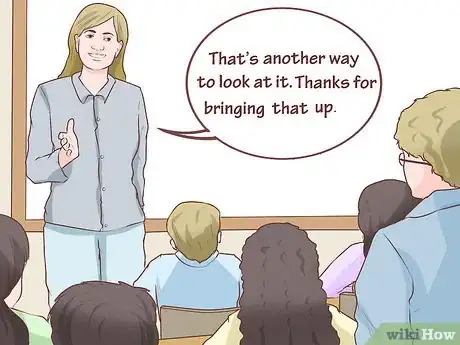This article was co-authored by Liana Georgoulis, PsyD. Dr. Liana Georgoulis is a Licensed Clinical Psychologist with over 10 years of experience, and is now the Clinical Director at Coast Psychological Services in Los Angeles, California. She received her Doctor of Psychology from Pepperdine University in 2009. Her practice provides cognitive behavioral therapy and other evidence-based therapies for adolescents, adults, and couples.
There are 7 references cited in this article, which can be found at the bottom of the page.
This article has been viewed 25,664 times.
Sometimes a gifted child may act out as a way to communicate something such as, “I’m bored!” or, “This isn’t interesting to me!” These behaviors can be difficult to manage when you have other children at home or more students in the classroom. If you’re struggling to manage a gifted child’s behavior, focus on building skills. Implement some tactics in the classroom to make school more enjoyable and interesting. Work with them to understand their emotions and cope with them effectively. If your child has social or emotional deficits, work with a therapist to help build these skills.
Steps
Handling Problem Behaviors
-
1Redirect problem behaviors. When gifted children have an outburst, make it a teachable moment. Help them navigate their own feelings and gain resolution by themselves with your guidance. Use redirection to help the child refocus onto something else.[1]
- You can predict problem behaviors and address them before they happen. For example, if your child has a hard time going off to school, give them warnings such as “In 20 minutes we’re getting in the car to go to school…. We are leaving in 10 minutes…” etc.
- For example, if the child often becomes upset during activity transitions, say, “I know change can be hard. What can we do to make it more fun? Can we skip to our next activity?”
- You may also give a gifted child a task or a job to perform to distract them. Framing the task as an important goal helps it appeal to the child's desire to apply their abilities and to be respected.
-
2Assert your authority. The gifted child may be argumentative or manipulative. When these behaviors occur, acknowledge the child’s argument yet be firm in your authority as an adult. Even if the child presents a convincing argument, refer them to your house or school rules and state simply that there are no exceptions.[2]
- Gifted children value being heard. Use active listening techniques including getting on their level, making eye contact, and restating their concerns. Then, hold firm with your rules. The child will better understand that you hear them, but that the issue is not flexible.
- For example, you can say, “I understand that you’re making a good point, however, it’s important to follow the house/school rules.”
Advertisement -
3Curb excessive talking. Your gifted child may want to tell you all about the books they read, the tv series they just finished, or their thoughts on a documentary. Make time and listen to the child. Engage with the child, ask questions, and make eye contact. If the talking happens at inappropriate times (like while you’re working or on the phone), let the child know that you can speak later. If the talking is truly out of hand, gently let the child know that many people don’t want to hear long summations of things.[3]
- Tell the child, “Tell me more content with fewer words.”
- You can also encourage your child to write, draw, paint, or use other non-verbal means of expression to help them process information. Get them a journal or a sketchbook and encourage them to put the information there.
Building Social and Emotional Skills
-
1Recognize uneven development. Some gifted children may have sharp wits or well-developed vocabularies and excellent reasoning skills, yet may still behave emotionally as their peers. One minute the child may be discussing politics, and the next moment they may cry over toys. Recognize that with intelligence does not often come maturity and that the child is still a child.[4]
- A gifted child may understand abstract ideas yet not be emotionally developed enough to deal with them. This can lead to fears about death, sex, the future, or getting older.
- Sometimes, you may even unconsciously treat your gifted child like they can self-comfort or understand emotional situations better than they can. Remember to treat your kid like a kid, including providing them support and comfort.
-
2Give your child emotional outlets. While a gifted child’s mind may run a mile-a-minute, this may not give them time for their emotions to catch up. This can lead to incredibly emotionally sensitive or underdeveloped children.[5] Talk about feelings and label emotions as often as possible, as this can lead to emotional understanding and better coping.[6] Say, “Wow, it looks like that girl made you sad” or, “I can see you feel upset when your brother takes your toy.”
- Talk about how to handle anger in public and at school. Sometimes, life is not fair and it might make them feel angry. Find healthy things that they can do while in these settings, such as go on a walk or sit in a quiet place.
- Let your child deal with feelings. If your child is angry, let them be angry. If your child is sad, let them be sad. Find an activity that helps your child express these emotions, such as punching a pillow, listening to music, or writing in a journal.
-
3Address social difficulties. Some gifted children don’t know how to relate well to their peers, which can lead to problems at school or in making friends. They might seek out older friends or get along better with the friends of their siblings. While this is somewhat normal, encourage the child to make friends with their peers. Find school activities (such as music or art) after-school activities (such as sports, martial arts, or cooking) that interest your child.[7]
- Don’t put your child in an activity that you loved when you were their age, but choose one that interests them.
- Remind the child that making and keeping friends means they don’t argue with every opinion that is different than theirs. Instead, they listen and share in polite conversations. Help your child understand how to avoid criticizing other children who are not at your child's advanced level.
- Enroll the child in a social skills group either at school or at a local mental health clinic as a way to teach and practice skills. If no group is available, reading material on building social skills could appeal to your child's sense of independence and self-education.
-
4Address any limitations. Sometimes, gifted children may have problems with fine motor or gross motor skills, leading to clumsiness and problems with holding a pencil or eating utensils. This can lead to severe frustration and emotional outbursts. Some children might have sensory problems and dislike certain sounds, fabrics, textures, tastes, or large groups of people. If your child has any of these problems, consider taking your child to get an evaluation through an occupational therapist.
- An occupational therapist can help your child help the child to integrate their senses and build skills around their deficits.[8]
Managing Classroom Behaviors
-
1Notice signs of boredom. Some children act up when bored or not intellectually stimulated. Especially if tasks are repetitive, the child may become bored and disinterested and look for interest elsewhere. If the student is often bored, have some more complex tasks available for when the child completes the first tasks. This can help motivate the child and keep their interest.[9]
- As a gifted child gets older, they need to learn how to entertain themselves. Encourage them to find their own projects where they can use their excess time constructively. If they ask you to entertain them, suggest some self-entertaining ideas instead.
-
2Create challenges. If a child is uninterested or not engaged with a task, find a way to make it a challenge. A gifted child may need challenges to feel motivated.[10] If at home, create a point system for completing chores or finishing homework. The child can then work toward certain goals (such as a toy or a movie) by completing the tasks. At school, find ways to challenge the child and then providing rewards or verbal praise.
- For example, to get a gifted child to complete a series of math problems, time them to see how many can get done in one minute, then see if they can beat that number in the next minute.
-
3Practice group work. A gifted child may dominate group work or try to get the other students on board with all of their ideas. They might not find it easy to interact with other classmates with differing opinions or ideas.[11]
- Create opportunities for group work yet with some boundaries. For example, maintain the same groups yet have different children lead activities, present, and share with the class. Be ready to let your child know when it's time for others to have their turn, and why sharing responsibilities is important.
- Create activities for the child that break up repetition, or make a game of it.
-
4Remember that challenges aren’t personal. If a gifted child challenges something you say in the classroom, don’t take it personally. Often, the child is curious and not trying to undermine your authority. As a teacher, you can choose whether to engage the comment or not. You can also show that differing viewpoints are not necessarily ‘right’ or ‘wrong’, just different.[12]
- You can say, “That’s another way to look at it. Thanks for bringing that up.”
References
- ↑ http://sengifted.org/gt-kids-and-behavior-seven-strategies-to-help-kids-and-parents-cope/
- ↑ https://www.verywell.com/social-and-emotional-problems-affecting-gifted-children-1449336
- ↑ https://www.empoweringparents.com/blog/helpful-tips-if-you-have-a-gifted-child-under-12/
- ↑ https://www.verywell.com/social-and-emotional-problems-affecting-gifted-children-1449336
- ↑ https://www.empoweringparents.com/blog/helpful-tips-if-you-have-a-gifted-child-under-12/
- ↑ https://www.psychologytoday.com/blog/sweet-emotion/201408/why-labeling-emotions-matters
- ↑ http://raisingchildren.net.au/articles/gifted_talented_children_behaviour_development.html
- ↑ http://childmind.org/article/treating-sensory-processing-issues/
- ↑ http://www.brighthubeducation.com/teaching-gifted-students/49993-disciplining-bad-behavior-in-gifted-children/
- ↑ http://www.brighthubeducation.com/teaching-gifted-students/49993-disciplining-bad-behavior-in-gifted-children/
- ↑ http://www.brighthubeducation.com/teaching-gifted-students/49993-disciplining-bad-behavior-in-gifted-children/
- ↑ http://www.brighthubeducation.com/teaching-gifted-students/49993-disciplining-bad-behavior-in-gifted-children/
